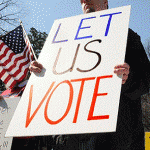No doubt there are many days when editors, even at the largest news outlets, have too many articles to read thoroughly and let a mistake slip through. Perhaps even a serious mistake like that made last Monday in the New York Times.
Only this was on the front page. And instead of correcting obviously bad reporting, the Times’ national news editor doubled down and claimed he has no responsibility to distinguish fact from fiction.
Here’s the scenario. National reporter Ethan Bronner wrote “A Tight Election May Be Tangled in Legal Battles,” (free sub. required) a story reporting on allegations of voter fraud and disenfranchisement. Well, reporting may be an overstatement. In classic “he said, she said” style, Bronner noted that some groups are concerned about voter fraud while others are concerned about voters being unable to vote due to restrictive new ID requirements. No attempt was made to weigh the relative credibility of the claims he portrayed.
 Of course, it’s been well-documented that in-person voter fraud has been nearly non-existent in the U.S., while mail-in fraud, among others, is more common.
Of course, it’s been well-documented that in-person voter fraud has been nearly non-existent in the U.S., while mail-in fraud, among others, is more common.
It also is well-documented that several new state Voter ID laws will render millions of Americans unable to vote without spending time and money (even if there is no fee for the actual ID), in many cases, lots of time and money to obtain “official” voter ID. Inarguably, the only kind of voter fraud could prevent is in-person fraud.
Of course, more than a few people complained to the Times, prompting their Public Editor, Margaret Sullivan, to run a follow-up column online, He Said, She Said, and the Truth. Most readers probably expected a “sorry, we’ll do better next time” mea culpa. Instead, the national editor, Sam Sifton, rejected the argument and defended his role as a stenographer.
“There’s a lot of reasonable disagreement on both sides,” he said. One side says there’s not significant voter fraud; the other side says there’s not significant voter suppression.
“It’s not our job to litigate it in the paper,” Mr. Sifton said. “We need to state what each side says.”
The Times response to a national editor declaring himself unwilling to do his job will be telling.
Update: hundred of readers have excoriated Mr. Sifton and Ms. Sullivan in the comments section of the public editor’s column. Ms. Sullivan’s contact information is included with her column.
